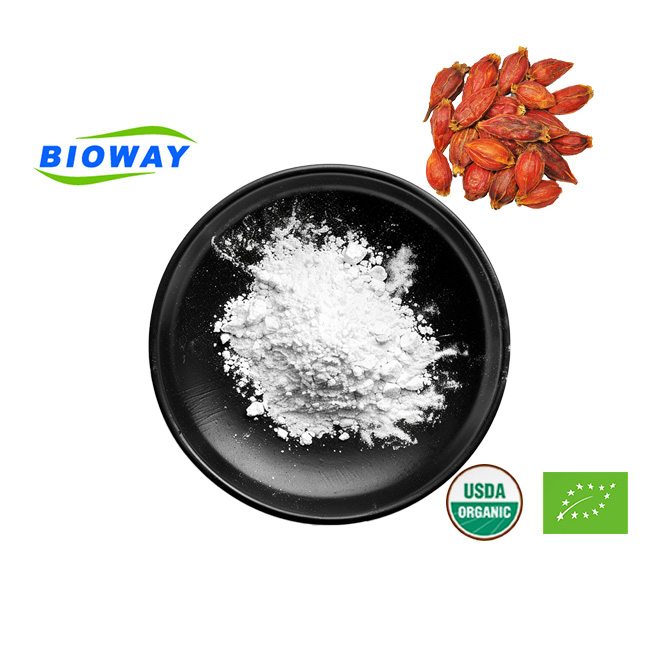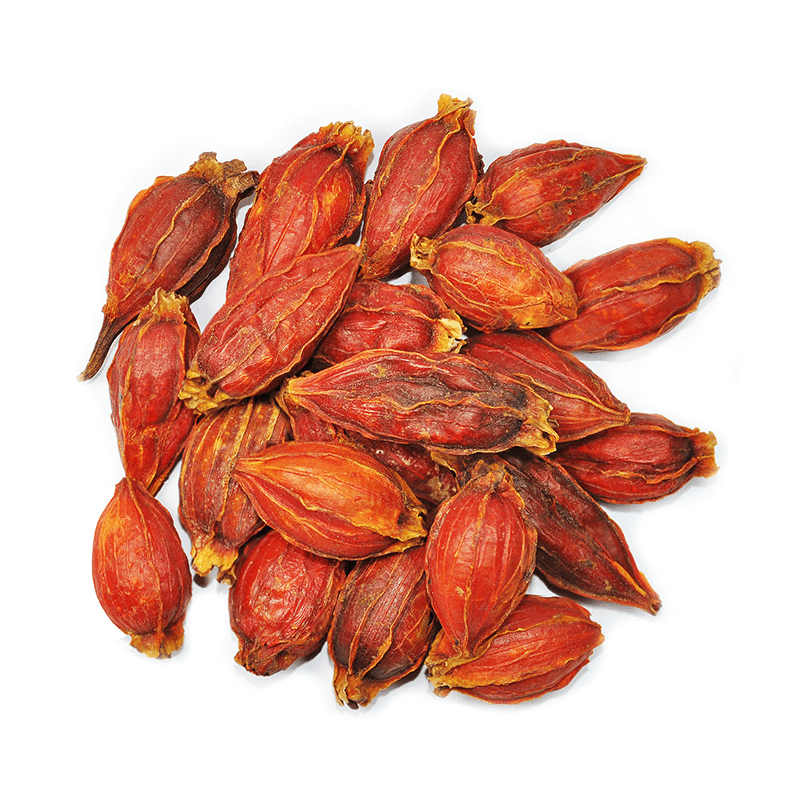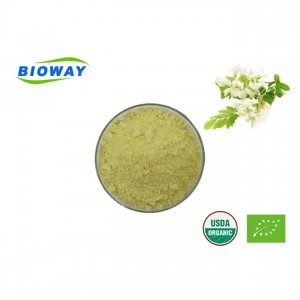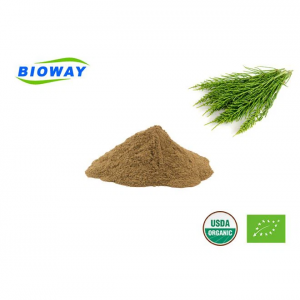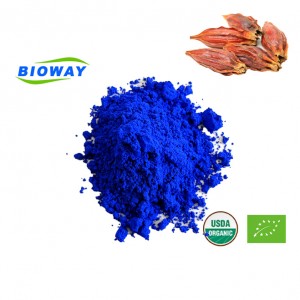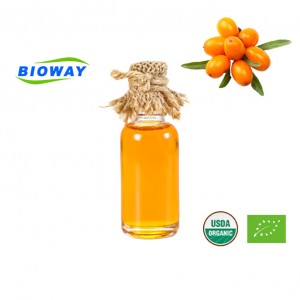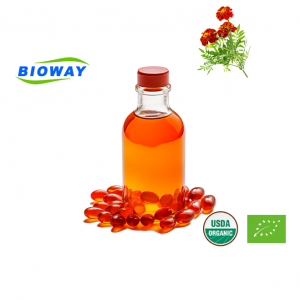Gardenia Extract Pure Genipin Powder
Gardenia extract genipin is a compound derived from the Gardenia jasminoides plant. Genipin is obtained from the hydrolysis of geniposide, a natural compound found in Gardenia jasminoides. Genipin has been studied for its potential medicinal and biomedical applications, including its antimicrobial, anti-inflammatory, and cross-linking properties. It is often used in the preparation of biomedical materials and drug delivery systems due to its unique chemical properties. Additionally, genipin has been investigated for its potential therapeutic effects in various health conditions. Contact us for more information: grace@biowaycn.com.
| Item | Standard | Result |
| Appearance | White Powder | Complies |
| Assay (Genipin) | ≥98% | 99.26% |
| Physical | ||
| Loss on Drying | ≤5.0% | Complies |
| Sulphated Ash | ≤2.0% | Complies |
| Heavy Metal | ≤20PPM | Complies |
| Mesh Size | 100% pass 80 mesh | 100% pass 80 mesh |
| Microbiological | ||
| Total Plate Count | ≤1000cfu/g | <1000cfu/g |
| Yeast & Mould | ≤100cfu/g | <100cfu/g |
| E.Coli | Negative | Negative |
| Salmonella | Negative | Negative |
1. Purity: Genipin powder is highly pure, often exceeding 98%, ensuring consistent and high-quality chemical composition.
2. Stability: Known for its stability, genipin powder is suitable for long-term storage and various manufacturing processes.
3. Cross-linking Properties: Genipin powder exhibits valuable cross-linking properties, particularly in biomedical materials, tissue engineering, and drug delivery systems.
4. Biocompatibility: The powder is biocompatible, making it suitable for various biomedical and pharmaceutical applications without adverse effects on living tissues.
5. Natural Sourcing: Sourced from natural botanical materials as a derivative of Gardenia Extract, genipin powder aligns with the growing consumer preference for natural and plant-based ingredients.
6. Versatile Applications: Genipin powder is utilized in various industries, including biomedical, pharmaceutical, cosmetic, and material science fields, showcasing its versatility and wide range of applications.
1. Anti-inflammatory Properties: Genipin has been studied for its potential anti-inflammatory effects. It may help reduce inflammation in the body associated with various health conditions.
2. Antioxidant Activity: Genipin exhibits antioxidant properties, which can help combat oxidative stress and reduce cellular damage caused by free radicals. This may contribute to overall health and well-being.
3. Neuroprotective Effects: Research suggests that Genipin may have neuroprotective properties, potentially supporting the health and function of the nervous system and offering potential benefits for neurological health.
4. Potential Anti-Tumor Activity: Studies have indicated that Genipin may possess anti-tumor properties, showing promise in oncology and cancer research. Its potential role in inhibiting tumor growth and proliferation is an area of ongoing investigation.
5. Traditional Medicinal Uses: In traditional medicine, Gardenia jasminoides has been used for various purposes, including its potential to support liver health, promote detoxification, and aid in certain health conditions.
6. Skin Health: Genipin has been explored for its applications in skin health, including its potential as a natural cross-linking agent in biomaterials and drug delivery systems for dermatological applications.
Overall, Gardenia Extract Genipin offers a range of potential health benefits, including anti-inflammatory, antioxidant, neuroprotective, and anti-tumor effects, making it a subject of interest for further research and potential therapeutic applications.
Gardenia Extract Genipin can be applied to:
1. Tattoo industry
2. Biomedical and material science
3. Pharmaceutical and cosmetic industries
4. Research and development
5. Textile and dyeing industry
6. Food and beverage industry
Packaging And Service
Packaging
* Delivery Time: Around 3-5 workdays after your payment.
* Package: In fiber drums with two plastic bags inside.
* Net Weight: 25kgs/drum,Gross Weight: 28kgs/Drum
* Drum Size & Volume: I.D.42cm × H52cm, 0.08 m³/ Drum
* Storage: Stored in a dry and cool place, keep away from strong light and heat.
* Shelf Life: Two years when properly stored.
Shipping
* DHL Express, FEDEX, and EMS for quantities less than 50KG, usually called as DDU service.
* Sea shipping for quantities over 500 kg; and air shipping is available for 50 kg above.
* For high-value products, please select air shipping and DHL express for safety.
* Please confirm if you can make the clearance when goods reach your customs before placing an order. For buyers from Mexico, Turkey, Italy, Romania, Russia, and other remote areas.
Payment And Delivery Methods
Express
Under 100kg, 3-5Days
Door to door service easy to pick up the goods
By Sea
Over300kg, Around 30 Days
Port to port service professional clearance broker needed
By Air
100kg-1000kg, 5-7Days
Airport to airport service professional clearance broker needed
Production Details (Flow Chart)
The production process of Gardenia Extract Genipin typically involves the following steps:
1. Sourcing: The process begins with the sourcing of Gardenia jasminoides Ellis plants, which contain geniposide, the precursor to genipin.
2. Extraction: The geniposide is extracted from the Gardenia jasminoides Ellis plants using a suitable solvent or extraction method.
3. Hydrolysis: The extracted geniposide is then subjected to a hydrolysis process, which converts it into genipin. This step is crucial in obtaining the desired compound for further processing.
4. Purification: The genipin is then purified to remove impurities and obtain a high-purity product, often standardized to a specific genipin content, such as 98% or higher, using techniques like chromatography.
5. Drying: The purified genipin may undergo a drying process to remove any residual moisture and obtain a stable, dry product suitable for various applications.
6. Quality Control: Throughout the production process, quality control measures are implemented to ensure the purity, consistency, and safety of the Gardenia Extract Genipin.
Certification
Gardenia Extract Genipin (HPLC≥98%) is certified by ISO, HALAL, and KOSHER certificates.
FAQ (Frequently Asked Questions)
Q: Comparison between geniposide and genipin:
A: Geniposide and genipin are two distinct compounds derived from the Gardenia jasminoides plant, and they possess different chemical and biological properties.
Geniposide:
Chemical Nature: Geniposide is a glycoside compound, specifically an iridoid glycoside, and it is found in various plants, including Gardenia jasminoides.
Biological Activities: Geniposide has been studied for its potential anti-inflammatory, antioxidant, and neuroprotective effects. It has also been investigated for its potential therapeutic applications in traditional medicine and modern pharmacology.
Applications: Geniposide has garnered interest in various fields, including pharmaceuticals, nutraceuticals, and herbal medicine, due to its potential health benefits. It has also been explored for its applications in skincare and cosmetic formulations.
Genipin:
Chemical Nature: Genipin is a compound derived from geniposide through a hydrolysis reaction. It is a chemical compound with cross-linking properties and is commonly used in biomedical and material science applications.
Biological Activities: Genipin exhibits antimicrobial, anti-inflammatory, and cross-linking properties. It has been utilized in the development of biomaterials, tissue engineering scaffolds, and drug delivery systems due to its biocompatibility and cross-linking capabilities.
Applications: Genipin has applications in various industries, including the biomedical and material science fields, pharmaceuticals, cosmetics, and research and development endeavors.
In summary, while geniposide is known for its potential health benefits and applications in traditional medicine and nutraceuticals, genipin is valued for its cross-linking properties and applications in biomedical and material science. Both compounds offer distinct chemical and biological characteristics, leading to diverse applications in different industries.
Q:Which plants are used to treat inflammatory problems excluding Gardenia extract genipin?
A: Several plants are traditionally used to treat inflammatory problems due to their potential anti-inflammatory properties. Some commonly known plants with anti-inflammatory effects include:
1. Turmeric (Curcuma longa): Contains curcumin, a bioactive compound with potent anti-inflammatory properties.
2. Ginger (Zingiber officinale): Known for its anti-inflammatory and antioxidant effects, often used to alleviate inflammatory conditions.
3. Green Tea (Camellia sinensis): Contains polyphenols, particularly epigallocatechin gallate (EGCG), which have been studied for their anti-inflammatory properties.
4. Boswellia serrata (Indian frankincense): Contains boswellic acids, which have been traditionally used for their anti-inflammatory effects.
5. Rosemary (Rosmarinus officinalis): Contains rosmarinic acid, known for its anti-inflammatory and antioxidant properties.
6. Holy Basil (Ocimum sanctum): Contains eugenol and other compounds with potential anti-inflammatory effects.
7. Resveratrol (found in grapes and red wine): Known for its anti-inflammatory and antioxidant properties.
It’s important to note that while these plants have been traditionally used for their potential anti-inflammatory effects, scientific research is ongoing to further understand and validate their efficacy in treating inflammatory conditions. Always consult with a healthcare professional before using herbal remedies for inflammatory problems.
Q: What is the mechanism of genipin?
A: Genipin, a natural compound derived from geniposide found in Gardenia jasminoides, is known to exert its effects through various mechanisms. Some of the key mechanisms of genipin include:
Cross-Linking: Genipin is widely recognized for its cross-linking properties, particularly in the context of biomedical applications. It can form covalent bonds with proteins and other biomolecules, leading to the stabilization and modification of biological structures. This cross-linking mechanism is valuable in tissue engineering, drug delivery systems, and the development of biomaterials.
Anti-Inflammatory Activity: Genipin has been studied for its potential anti-inflammatory effects. It may modulate inflammatory signaling pathways, inhibit the production of pro-inflammatory mediators, and reduce oxidative stress, contributing to its anti-inflammatory properties.
Antioxidant Activity: Genipin exhibits antioxidant properties, which can help mitigate oxidative stress and protect cells from damage caused by reactive oxygen species.
Biocompatibility: In biomedical applications, genipin is valued for its biocompatibility, meaning it is well-tolerated by living tissues and cells, making it suitable for use in various medical and pharmaceutical contexts.
Other Biological Activities: Genipin has been investigated for its potential effects on cell proliferation, apoptosis, and other cellular processes, contributing to its diverse range of biological activities.
These mechanisms collectively contribute to the wide-ranging applications of genipin in biomedical, pharmaceutical, and material science fields. However, it’s important to note that ongoing research is continually expanding our understanding of the mechanisms and potential applications of genipin.
Q: What are the antiinflammatory effects of genipin an active principle of gardenia?
Genipin, an active principle of Gardenia jasminoides, has been studied for its potential anti-inflammatory effects. Research suggests that genipin may exert anti-inflammatory properties through various mechanisms, including:
Inhibition of Inflammatory Mediators: Genipin has been shown to inhibit the production and release of pro-inflammatory mediators such as cytokines, chemokines, and prostaglandins, which play a key role in the inflammatory response.
Modulation of Inflammatory Signaling Pathways: Studies have indicated that genipin may modulate signaling pathways involved in inflammation, such as the NF-κB pathway, which regulates the expression of inflammatory genes.
Reduction of Oxidative Stress: Genipin exhibits antioxidant properties, which can help reduce oxidative stress and inflammation associated with reactive oxygen species.
Inhibition of Inflammatory Enzymes: Genipin has been reported to inhibit the activity of enzymes involved in the inflammatory process, such as cyclooxygenase (COX) and lipoxygenase (LOX), which are responsible for the production of inflammatory mediators.
Regulation of Immune Responses: Genipin may modulate immune responses, including the regulation of immune cell activation and the production of inflammatory cytokines.
Overall, the anti-inflammatory effects of genipin make it a subject of interest in the development of potential therapeutic agents for conditions characterized by inflammation. However, further research is needed to fully elucidate the mechanisms and potential clinical applications of genipin as an anti-inflammatory agent.





